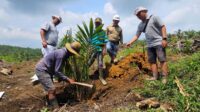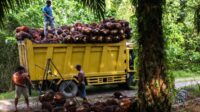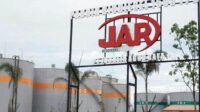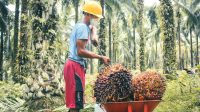PALMOILMAGAZINE, JAKARTA – For decades, independent smallholders have contributed a meaningful portion of Indonesia’s palm oil output, yet too often they have remained at the edges of formal supply chains. As global buyers demand deforestation-free commodities and regulators tighten compliance rules, the question has become urgent: how can these farmers be recognized, supported, and integrated into sustainability frameworks?
In Aceh Tamiang, a pilot collaboration led by IDH Indonesia is beginning to offer some answers. Working alongside PUPL Aceh Tamiang, RSPO-certified independent smallholders, PT Mora Niaga Jaya, and Koompasia, the initiative is testing how partnerships and private-sector commitment can turn smallholder inclusion from aspiration into market reality.
Beyond Technology: The Role of Partnership
During recent field trials, partners tested the Jejak Sawit platform to follow fresh fruit bunches (FFB) from a certified smallholder’s field to PT Mora Niaga Jaya’s mill. The digital system provided transparency but stakeholders emphasize that the tool is just one part of a larger story.
“Technology can help us record the journey of palm oil,” said Dr. M. Windrawan Inantha, Deputy Director for Market Transformation (Indonesia) at RSPO to beige-heron-208544.hostingersite.com, Thursday, September 4, 2025. “But what really matters is the willingness of companies and communities to work together. Without collaboration, tools alone will not change the system.”

Commitment Emerging
While the app demonstrated the value of digital traceability, the strongest signal of progress came from the private sector’s willingness to back smallholders with real commitments. At a follow-up meeting hosted by PUPL Aceh Tamiang, PT Mora Niaga Jaya announced its intention to provide additional efficiency and sustainability incentives for RSPO-certified independent smallholders. These incentives, if implemented, would go beyond the government-regulated price, signalling recognition of the value farmers create when they adopt responsible practices. When smallholders commit to sustainable practices, mills and buyers must also commit to rewarding them fairly.
This kind of corporate engagement is critical. Incentive structures can encourage wider adoption of certification, motivate farmers to stick with sustainability standards, and demonstrate to global buyers that local mills are serious about compliance.
Implications for Global Trade
Such early steps in Aceh Tamiang could help determine how Indonesia positions itself in international markets. The EU Deforestation Regulation (EUDR) requires full traceability, and buyers in China and India are also increasingly sensitive to sourcing risks. Demonstrating that mills and independent smallholders can collaborate on transparent, incentive-based supply chains could give Indonesia an edge in meeting these demands.
“Independent smallholders are an important part of the future of sustainable palm oil,” Windrawan emphasized. “The challenge is ensuring they are integrated into the physical supply chain so that their production is fully traceable. With collaboration and strong private-sector leadership, their inclusion can become both visible and meaningful in global markets.”
A Promising Start
The initiative is still in a testing phase. Much work remains to expand participation, refine incentive models, and build trust across the chain. But the direction is clear: visibility for smallholders will not come from digital tools alone, but from partnerships where private companies are willing to translate sustainability into practical benefits on the ground.
Aceh Tamiang’s pilot may be modest in scale, but it carries a larger message to the global trade community: inclusive supply chains depend as much on commitment and collaboration as they do on technology. The lesson for global trade is clear: integrating smallholders is not charity. It is a prerequisite for meeting regulatory demands, safeguarding supply security, and ensuring palm oil’s place in the future of sustainable commodities. (P3)





































